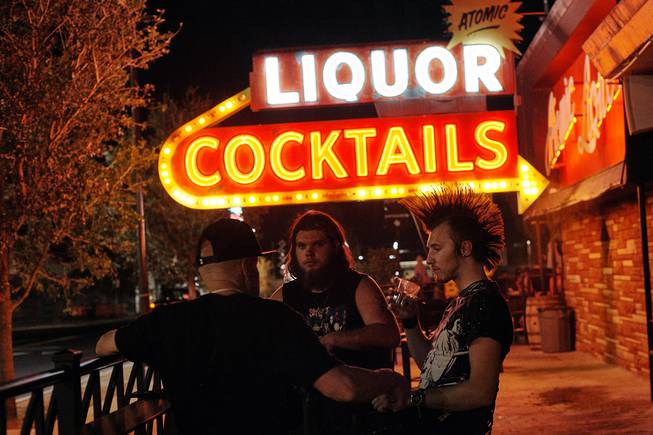
Bridget Bennett / The New York Times
Patrons gather for a drink outside Atomic Liquors before bars were ordered to shut down again to prevent coronavirus spread in Las Vegas, July 10, 2020.
Wednesday, July 15, 2020 | 2 a.m.
At midnight on Friday, bars across Las Vegas and Reno shut down for a second time in six months. With the coronavirus surging, the governor of Nevada had ordered it, and Las Vegas’ oldest free-standing bar, Atomic Liquors, was no exception.
On the one hand, Atomic was lucky. The governor’s new ban excluded bars that serve food, so Katie Cruz, Atomic’s operations director, began herding patrons from the inky neon lounge to the garden of its attached restaurant, only a few feet away. But there was loss, too: Atomic’s bar, the historic core of the business, complete with mementos of the stars who imbibed there when Fremont Street was the heart of Las Vegas, is its biggest draw.
In a city that is all about tourism and entertainment, the coronavirus response has felt like an especially risky roll of the dice. The bars were closed, then opened, then closed again. Now in watering holes like Atomic, tavern license #00001, it was painfully hard to be sure what might come next or whether the regulations — including loopholes — would make much difference.
“It feels unfair,” Cruz said. “We’ve been following all the rules to a T, trying to protect our regulars.”
The picture in the state, though, is bleak: Cases in Nevada have reached their highest levels yet in recent weeks, with more than 700 being announced on an average day. Clark County has been hit hardest, accounting for more than 22,000 of the state’s 26,845 total cases.
Cruz has spent months nursing the Atomic and its staff through coronavirus-related crises. She trained bartenders to serve food in the adjoining restaurant when bars closed for the first time this spring. She taught servers to clean booths “the Katie way,” twice over with strong disinfectant. She’s spent long nights on the phone with staffers and friends out of work and in debt. She said she has been trampled and bruised by “really mean” people who refuse to wear masks.
Atomic Liquors has seen plenty of history. It was founded in 1947 by Stella and Joe Sobchik, who named it Virginia’s Cafe after Stella’s mother. In 1952, they turned it into Atomic Liquors, a package goods store with a “pouring license.”
In the 1950s, locals used to sit on the roof of the Atomic, drink Joe Sobchik’s “atomic” cocktail concoctions and watch the nuclear test blasts mushrooming up from the Nevada Test Site, 65 miles away in the desert.
Atomic catered to its working class neighbors, but also grew into a retreat for Vegas’ glitzy performers who wanted to unwind away from the spotlight. The Rat Pack — Frank Sinatra, Dean Martin, Sammy Davis Jr., Peter Lawford and Joey Bishop — were said to kick back at Atomic after their shows. So did Clint Eastwood, Hunter S. Thompson and the Smothers Brothers. The only bar stool with a back — now emblazoned with a star — was reserved for Barbra Streisand, who, legend holds, played pool late at night. Scenes from the Martin Scorsese film “Casino” were filmed inside Atomic and its next-door garage, now the restaurant.
The bar’s regulars see it as home.
“This bar is my living room. It’s all of ours,” said Jessica Baldwin, who lives in the apartment building next door. Most nights Baldwin and two of her friends gather at one of their homes, then decamp to Atomic.
Preferring the old bar, dim and intimate, over Atomic’s newer restaurant, the trio said they will wait out the closure in one of their homes, as they did earlier this spring when it closed before.
Sean Foley, 49, said he had come to Las Vegas from his home in Utah for a medical conference. As he got off the plane he received two pieces of bad news: his meeting had been scratched, and Las Vegas bars were closing at midnight.
Seized by nostalgia, he headed for Atomic. “My grandfather used to come here,” Foley said. He was a judge who wore a coat and tie every day, Foley said of his grandfather, who died in 2014 at age 97.
“He was a gentleman’s gentleman,” he said, adding that his grandfather sipped drinks on the roof of Atomic in the days before Fremont Street was eclipsed by the Strip.
Fremont Street is an arts district now, and the home of Zappos, the shoe company whose headquarters is in Las Vegas’ old town hall, and whose employees are among Atomic’s clientele.
It was nearly 2 a.m. when Cruz issued the last drinks call of the evening on the restaurant-side of the operation. The bar side had long since been shuttered.
Beyond the bar, the pandemic has hit home for Cruz. She said that her godmother, a 61-year-old teacher in Arizona, had died from the virus. And her father, Bill Cruz, lives in town, but “I haven’t seen him since March,” Cruz said. “I would not be able to live with myself if he got infected.”
Cruz said she was thankful to be able to shift operations to the restaurant. Not a single employee has gotten sick, she said. But the need for social distancing and the surging virus has cut her customers, and contributed to “so much uncertainty,” she said.
“We’re in this position because people didn’t follow the rules,” she said. “I know we’ll withstand this. But I don’t know if it will be the same afterward.”
